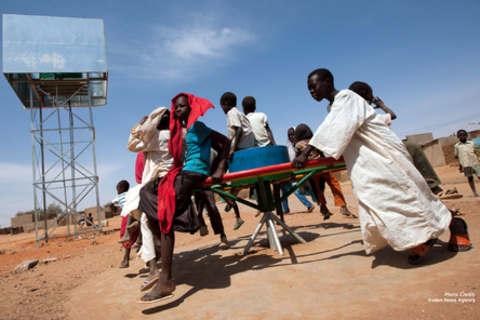Fools Fear Failure: Designing Better Ways to Fail
Is there something unique about the social sector that leads to an unwillingness to learn from failure?
It's well known that failure is sticky; people learn better from stories of failure than they do from success stories. Yet, in the social sector, failure is rarely discussed. Instead of treating projects and ideas that failed before us as a massive repository of R+D knowledge, these invaluable stories are often never told or actively swept under the carpet.
As human-centered designers, we fail often and quickly as part of the design process. We also excel at telling stories in a manner that is convincing to clients and customers. This panel asks: how might we use our skills as designers to create a new mindset in the social sector that says "I failed and here's the story of how it happened"?
Moderated by the Knowledge Manager from IDEO.org, this panel brings together designers, master storytellers, and veterans of many a social sector failure to explore this topic.
Presenters

Ashley started Admitting Failure in January 2011 and has built a career around being an expert on failure—or, more specifically, on learning from it.
Her work has catalyzed a change in the way we think about innovative problem solving, challenging our perception of failure and demonstrating the validity of an approach based on testing to learn, especially when faced with complex, non-linear problems.
Ashley has worked with a range of organizations—from donors and foundations to non-governmental organizations and private sector companies—to use failure as a learning tool and culture driver to support and foster innovation. Ultimately, her work helps increase organizational performance by maximizing the "learning ROI" from failures and building an acceptance of failure as a catalyst for the innovation and collaborative learning needed to address complex problems.
Her work on failure has received coverage in a wide range of media and news outlets, including the Stanford Social Innovation Review, The Guardian, Harvard University’s Hauser Center for NonProfit Organizations, TED talks, BBC World and, most recently the New York Times. She also recently made the list of finalists for the HBR/McKinsey Innovating Innovation Award.
Before launching Admitting Failure, Ashley worked in Cairo at the co-ordinating center for the United Nations Environment Programme and as a management consultant in Vancouver. She joined Engineers Without Borders Canada (EWB) in 2009 where, after spending a year in Northern Ghana on agribusiness projects, she built and continues to lead EWB's Organizational Learning Team and annual Failure Report.

Ela is passionate about the capacity of human-centered design and design thinking to empower people to create their lives, organizations, offerings, community and world. She believes that innovation is fundamentally about human experiences: experiences leading people to innovate; and experiences of all those touched by an innovation, leading it to be embraced and impactful.
She consults, coaches and teaches in design research, strategy, and innovation through her independent business i2i Experience, with other senior IDEO alumni, through organizations including Experience Point (IDEO's workshop partner), and at academic institutions including Olin College.
Ela steeped deeply in the people and process of design in thirteen years at IDEO. At the time of her departure in October 2012, Ela was a Content Guide coaching teams and clients in Design Research and Strategy.
Throughout her IDEO time she worked to share design thinking with professionals and young people by leading collaborative "transformation" projects, workshops, and courses internally at IDEO as well as with organizations including MIT/Sloan, Olin, Harvard, the Eileen Fisher Leadership Institute, and the International Development Design Summit. She was chosen to help share IDEO process and culture in IDEO's Shanghai studio as it was getting established.
With depth in both design research and engineering, Ela led projects at IDEO through front-end user research, opportunity synthesis, concept development, and prototyping. Her work spanned products, services, packaging, and merchandising including the consumer health, financial, telecommunication, consumer electronics, pet, and food & beverage industries. Ela has worked in both developed and developing markets, and with both for-profit and non-profit organizations.
Whenever possible her work has focused on positive change, including work around education, elderly independence, diet and diabetes for clients like Beaver Country Day School, Eli Lilly, PepsiCo, GSK and GM.

Jaspal’s primary focus is on human-centered design for technology and service innovation in global public health. Through Gobee, a company that he co-founded in 2008, he and his teams consult organizations on various issues related to innovation to improve population health. Recent clients include: Clinton Health Access Initiative, Vodafone Group, Skoll Foundation, World Bank, and Alameda County Public Health Department.
He has designed a globally unique public health innovation course and teaches to graduate public health, business, engineering, and policy students at the University of California, Berkeley. Prior to Gobee, he worked with the Mongolian Ministry of Health on the design of health information systems as a Fulbright scholar in rural Mongolia. He received his PhD from the University of California, Berkeley, and his Master’s and Bachelor’s degrees from the Massachusetts Institute of Technology. He speaks Punjabi, Spanish, Mongolian, and English.

Sean oversees IDEO.org’s mission to spread human-centered design throughout the social sector. In his role as Knowledge Manager, Sean helps to document and tell stories about how IDEO.org is using human-centered design to tackle poverty-related challenges around the world. Sean also oversees HCD Connect, a web platform created by IDEO.org for human-centered designers working on challenges in low-income communities, and has taught human-centered design workshops from Lusaka to Hyderabad to NYC. Sean also serves as IDEO.org's In-House Counsel.
Sean joined IDEO.org after two years as the executive director of a Boston-based social enterprise with an innovative educational approach that combined a technology skills curriculum with cultural preservation training. Prior to entering the world of social enterprise, Sean worked as a corporate attorney for four years. Sean holds an undergraduate degree from Columbia University and a law degree from Georgetown.



